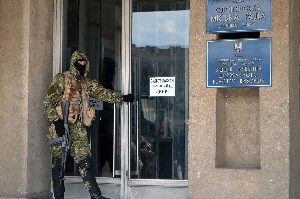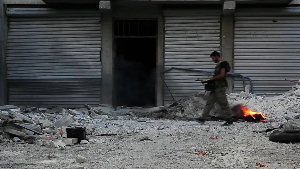The Sundry Motivations of Caucasians in Ukraine
By Emil Souleimanov (10/15/2014 issue of the CACI Analyst)
One attribute of the armed conflict in eastern Ukraine’s Donbas area has been numerous speculations on the involvement of foreign fighters on both sides to conflict. Amid the diverse body of volunteers and mercenaries involved in the war, Chechens and other North Caucasians have received particular attention due to their fame as fierce warriors, and because their involvement in the conflict on the side of pro-Russian forces has constituted solid evidence of Moscow’s military engagement in the war. Yet the fact that Caucasian volunteers participate also on the Ukrainian side, and the ambivalence toward the conflict locally in the North Caucasus, demonstrate the diversity of motives and incentives inducing Caucasians to fight in Ukraine.

Split Among North Caucasian Fighters in Syria
By Emil Souleimanov (07/02/2014 issue of the Turkey Analyst)
News has recently resurfaced in media outlets across the world referring to Omar al-Shishani, an ethnic Chechen leader of the north-Syrian sector of the Islamic State of Iraq and Syria (ISIS), as one of the presently most influential and reputed jihadist leaders. Indeed, since around 2012, when fighters of North Caucasian origin appeared at the forefront of international jihadists engaged in the Syrian civil war, they have become a significant component of the anti-Assad force. They have grouped into various, increasingly divergent, mujahideen armies and their prospective return to the North Caucasus holds significant security implications.

Umarov's Death and the Future of the North Caucasus Insurgency
By Tomáš Šmíd (05/07/2014 issue of the CACI Analyst)
Federal authorities, the Chechen administration, and North Caucasian Islamist insurgents have confirmed the death of Doku Umarov, leader of the Caucasus Emirate. His successor, Ali Askhab Kebekov, is the first non-Chechen to lead the insurgents in the North Caucasus and is also the first leader who does not have a militant background. This change could signify a considerable shift in how the entire insurgency operates. As Kebekov is a Dagestani Avar, it may be expected that intensification of the “Dagestanization” of insurgents, which has already been underway for several years, will continue. In addition, he will influence operations as a religious leader and not as a fighter.

"Russia Will Not Abandon the Caucasus," Putin Tells Armenia
By Haroutiun Khachatrian (the 11/12/2013 issue of the CACI Analyst)
Russia's President Vladimir Putin visited Armenia on December 3, for the third time since he took office in 2000. The visit was strategically scheduled immediately after the EU's Eastern Partnership summit in Vilnius.





